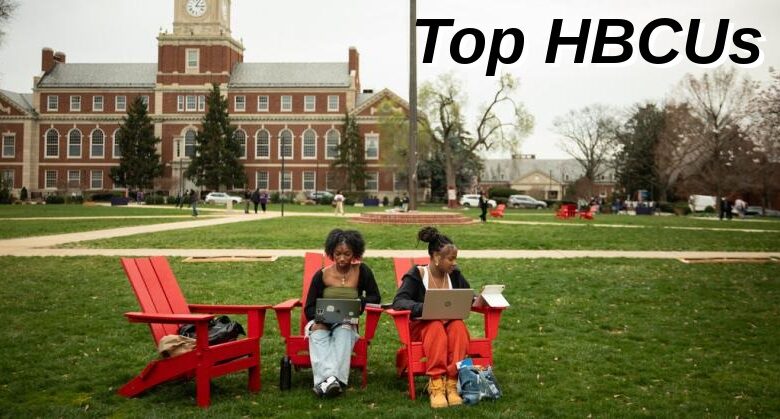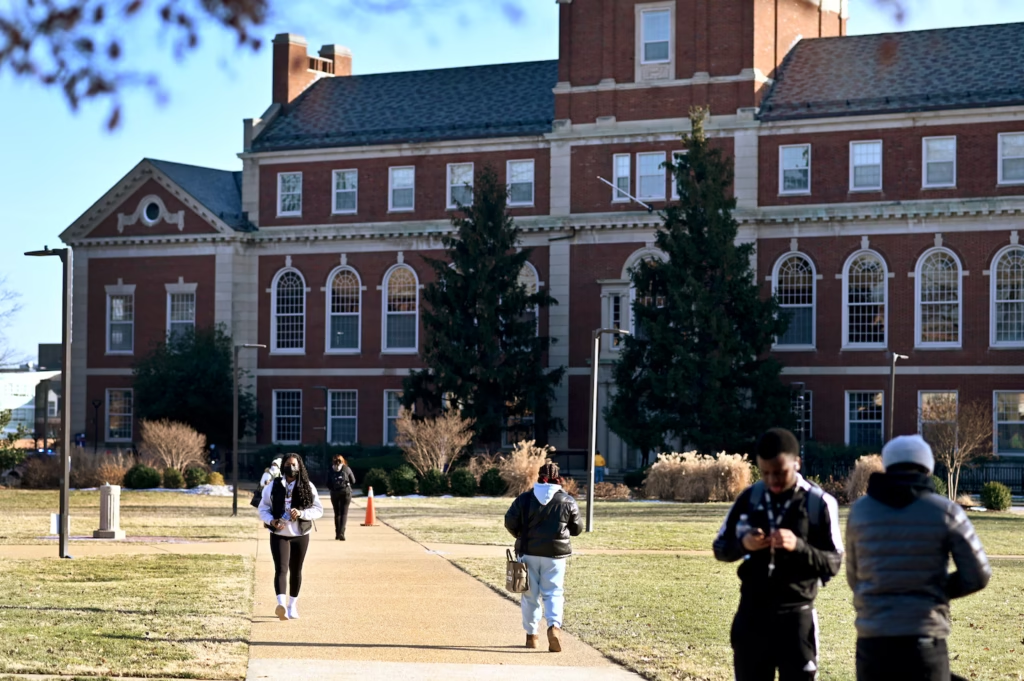Top HBCUs: A Complete Guide to Historically Black Colleges and Universities

Introduction to HBCUs and Their Legacy
When people hear the term Top HBCUs they often think of vibrant campuses filled with rich culture, strong academics, and a long-standing tradition of empowering students. HBCU stands for Historically Black Colleges and Universities, and they’ve played an important role in American education since the 19th century. These schools were originally founded to provide African American students access to higher education during times of segregation when opportunities were severely limited.
Fast forward to today, and HBCUs have become hubs of academic excellence, leadership training, and cultural pride. Many of the most influential leaders, artists, and innovators in the Black community — from civil rights icons to business executives — got their start at HBCUs. While they remain deeply rooted in serving African American communities, their influence extends far beyond, welcoming students from all walks of life.
So when we talk about Top HBCUs we’re not just talking about rankings on a list. We’re talking about schools that stand out for their academic reputation, strong alumni networks, student support systems, and undeniable cultural impact. Let’s dive into some of the best HBCUs that continue to shape the future.
Why HBCUs Still Matter in Today’s World
In a world where students have endless choices of colleges and universities, you may wonder: why are Top HBCUs still so important? The answer is layered and compelling. HBCUs provide more than an education — they provide a sense of belonging, cultural understanding, and mentorship that is hard to replicate at other institutions.
One of the strongest reasons Top HBCUs remain relevant is their ability to support first-generation college students. Many HBCUs have systems in place to help students who are the first in their families to pursue higher education, offering them guidance that extends beyond academics. The faculty and staff are often deeply invested in student success, ensuring no one feels left behind.
Additionally, HBCUs continue to contribute significantly to the workforce. Even though they represent a small percentage of American colleges, Top HBCUs produce a high proportion of Black doctors, lawyers, engineers, and educators. These institutions are proof that representation in higher education can directly impact diversity and excellence in professional fields.
Lastly, the cultural experience is unmatched. From lively homecomings and step shows to academic traditions rooted in excellence, the HBCU experience is one-of-a-kind. It’s not just about getting a degree — it’s about gaining an identity, a community, and a lifelong family.
Howard University: The Mecca of Top HBCUs

When people talk about the Top HBCUs Howard University almost always comes up first. Known as “The Mecca,” Howard has built a reputation as one of the most prestigious HBCUs in the country. Located in Washington, D.C., this university has been a powerhouse of Black excellence since its founding in 1867.
Howard is home to some of the most competitive academic programs, especially in law, medicine, and fine arts. Its alumni list reads like a “who’s who” of influential leaders, including Thurgood Marshall, the first African American Supreme Court Justice, and Vice President Kamala Harris. The university’s ability to nurture leadership is one of the biggest reasons why it stands tall among Top HBCUs.
Beyond academics, Howard also thrives as a cultural center. Its annual homecoming is legendary, attracting students, alumni, celebrities, and supporters from around the country. The atmosphere is electric, and it shows the pride and connection people feel to this institution. Howard is not just a university — it’s a movement that continues to inspire generations.
Spelman College: Empowering Black Women Leaders
If Howard is “The Mecca,” then Spelman College is often referred to as the crown jewel of women’s education among Top HBCUs. Located in Atlanta, Georgia, Spelman is a private, all-women’s HBCU that consistently ranks among the top liberal arts colleges in the nation, not just among HBCUs.
Spelman’s legacy is rooted in empowering Black women to lead in every field imaginable. The college produces a significant number of graduates who go on to pursue advanced degrees, particularly in STEM fields where women of color are often underrepresented. That’s why Spelman is more than a college; it’s a launchpad for breaking barriers and rewriting narratives.
The supportive environment at Spelman is one of its most admired qualities. With a low student-to-faculty ratio, students receive personal mentorship and guidance that helps them excel academically and professionally. Spelman’s alumni network is strong and dedicated, often opening doors for young graduates to step confidently into careers and leadership positions.
Morehouse College: Shaping Men of Distinction
Directly across the street from Spelman is Morehouse College, another Atlanta powerhouse and arguably the most well-known all-male HBCU. Morehouse has a strong reputation for shaping men into leaders, thinkers, and changemakers. Since its founding in 1867, Morehouse has held tightly to its mission of producing men who embody excellence, integrity, and service.
The alumni list is nothing short of impressive. Dr. Martin Luther King Jr., Samuel L. Jackson, and Spike Lee are just a few names that highlight the caliber of Morehouse graduates. These men have left an indelible mark on history, proving that Morehouse doesn’t just educate — it molds world-changers.
Culturally, Morehouse provides a brotherhood that lasts a lifetime. The bonds students form on campus often turn into networks of professional and personal support after graduation. From rigorous academics to cultural pride, Morehouse continues to stand as one of the top Top HBCUs that shape leaders the world will remember.
Florida A&M University (FAMU): Excellence and Innovation
Florida A&M University, better known as FAMU, is one of the largest Top HBCUs in the nation. Located in Tallahassee, Florida, FAMU has earned its place among the top Top HBCUs through strong academic programs, especially in business, pharmacy, and journalism.
What sets FAMU apart is its commitment to innovation and opportunity. The university has built strong partnerships with industries, giving students real-world experiences that prepare them for the workforce. Employers often seek out FAMU graduates because of the quality of education and training they receive.
Beyond academics, FAMU is also famous for its Marching 100 band — a cultural icon that has performed all over the world, even at presidential inaugurations. The school spirit is unmatched, and it creates a vibrant campus culture where students can balance serious academic work with pride and tradition.
Other Notable Top HBCUs That Deserve Recognition
While Howard, Spelman, Morehouse, and FAMU often grab the spotlight, there are dozens of other Top HBCUs making a huge impact.
- North Carolina A&T State University (NCAT): Known for its engineering and agriculture programs, NCAT is also the largest Top HBCUs in the nation by enrollment. Its research contributions are outstanding, and it produces more Black engineers than any other school in the country.
- Hampton University: With a strong focus on academics and cultural heritage, Hampton is a Virginia-based Top HBCUs that has earned national recognition. Its programs in business, nursing, and pharmacy are top-tier, and the campus is known for its beautiful waterfront location.
- Tuskegee University: Founded by Booker T. Washington, Tuskegee has a proud history of scientific achievement, including its contributions to aeronautics and agriculture. It’s also home to the legendary Tuskegee Airmen, who played a critical role in World War II.
These schools may not always be at the very Top HBCUs of the rankings, but their contributions to education and society are impossible to ignore.
The Future of Top HBCUs
Looking forward, the future of Top HBCUs seems brighter than ever. With renewed interest in their cultural and historical significance, many HBCUs are experiencing growth in applications, funding, and recognition. Large corporations and philanthropists have also been investing in these institutions, recognizing their vital role in shaping future leaders.
Technology and innovation are also becoming major focal points. Many Top HBCUs are expanding their STEM programs, building state-of-the-art facilities, and encouraging entrepreneurship. This positions them as not just keepers of tradition but as forward-thinking institutions ready to meet the challenges of tomorrow.
Perhaps most importantly, Top HBCUs continue to serve as safe spaces where students can thrive academically and personally while celebrating their culture. That balance of tradition and progress makes HBCUs unique, and it’s why they’ll always hold an important place in higher education.
Conclusion: Why Top HBCUs Are More Than Just Rankings
When we talk about the Top HBCUs it’s easy to get caught up in rankings and lists. But the truth is, every HBCU has its own strengths, traditions, and contributions that make it special. From Howard and Spelman to FAMU and NCAT, these schools embody excellence, resilience, and pride.
Top HBCUs are more than just colleges — they are communities, movements, and legacies. They represent the past struggles and future triumphs of generations of students. Whether you’re considering attending one, supporting one, or simply learning about them, HBCUs deserve admiration for the way they’ve shaped not only Black excellence but American excellence as a whole.
So when you hear the phrase Top HBCUs remember: it’s not just about where they rank. It’s about their impact, their culture, and the way they continue to inspire the world.